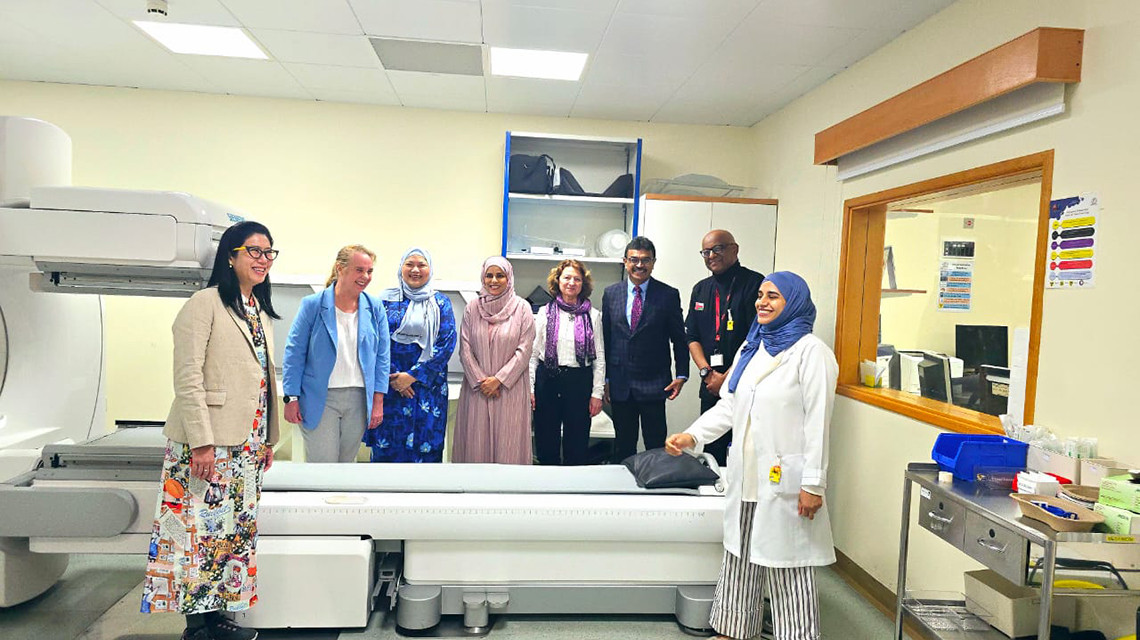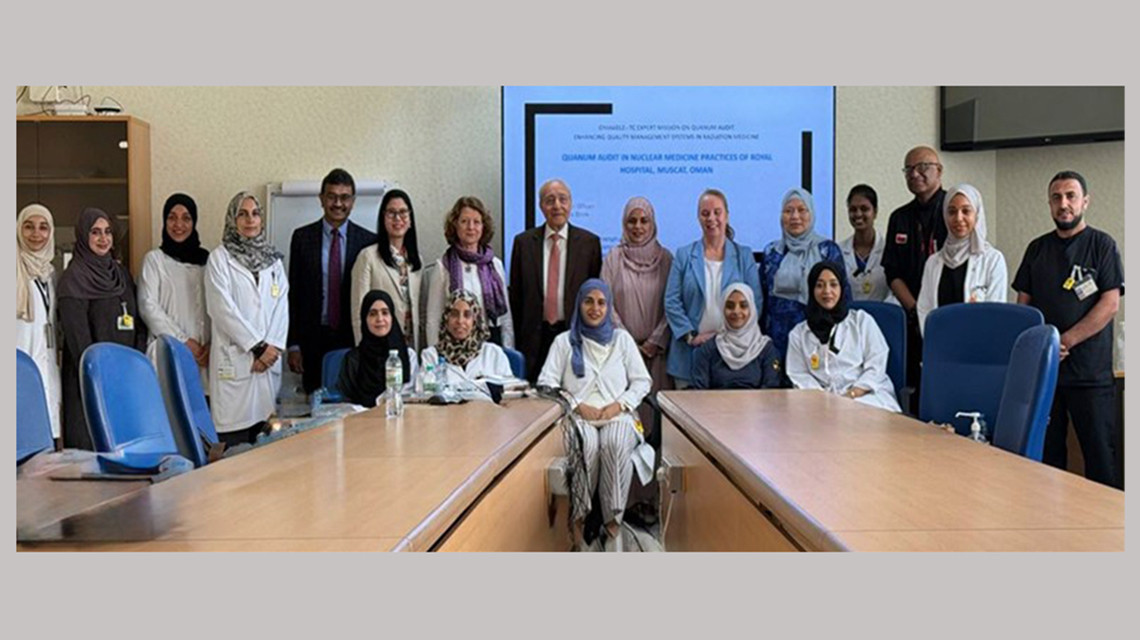The IAEA carried out a Quality Management Audit in May in Nuclear Medicine Practices at Oman's Royal Hospital - the country's first institution to successfully complete a comprehensive peer review of its nuclear medicine services.
The findings will enable the Royal Hospital to strengthen its processes and practices further, thereby enhancing the care that the country's patients receive.
"Regular audits and assessments, underpinned by an overall quality management system, are essential for assuring the highest standard of care, especially against the backdrop of growing patient volumes," explained Diana Paez, Head of Nuclear Medicine and Diagnostic Imaging in the IAEA Division of Human Health. "As a globally accepted programme which nuclear medicine departments can utilize to benchmark their practices against international standards, the IAEA Quality Management Audit in Nuclear Medicine Practices (QUANUM) identifies strengths as well as areas for improvement. This, in turn, helps to promote a culture of continuous evaluation, monitoring and improvement."
The Royal Hospital serves as Oman's a national referral centre for more than 4.6 million people. Its nuclear medicine department undertook an internal audit which reviewed all clinical, technical, operational, administrative and management-related procedures to strengthen the quality of its offerings. After completion of this first step of the QUANUM process, the department requested the IAEA to conduct this external assessment.
In preparation, the department submitted all relevant documentation; notified all stakeholders; ensured the availability and participation of key staff members; prepared an introductory presentation; and arranged for access to all areas relevant to audit's scope.

As part of the in-person portion of the QUANUM audit, international health experts systematically reviewed the Royal Hospital's nuclear medicine practices, processes and protocols. (Photo: Royal Hospital Nuclear Medicine Department)
The QUANUM Mission in Oman
From 4 to 8 May, the IAEA's human health specialists alongside international radiation medicine experts - including from the Rays of Hope Anchor Centre in Thailand - joined Omani counterparts for the in-person portion of QUANUM audit. Over the course of the week, the team reviewed all departmental activities from patient referrals to follow-ups. They systematically observed how patients are onboarded; how diagnostic studies are performed; and how therapeutic interventions are administered. The team also toured the facilities, interviewed staff and examined equipment.
"The national project under which this audit was organized, OMA6012, aims to strengthen national capabilities in the diagnosis and treatment of communicable and non-communicable diseases through adequate quality management systems," said Ashley Bantelman, IAEA Programme Management Officer. "The QUANUM mission was an important step in supporting Oman to realize this objective."
Organized through the IAEA's human health programme and under a national technical cooperation project, the mission also reviewed the department's radiation safety and protection practices, data handling protocols and quality assurance processes.
At the end of the mission, the IAEA team of auditors presented their findings highlighted the department's good practices and areas for improvement. A formal QUANUM report, forthcoming, will conclude this mission and convey the results of this detailed audit.
"The QUANUM audit had a significant and positive impact on our department. It not only validated the strengths of our existing quality management system but also provided us with valuable insights and practical recommendations for continuous improvement,", said Khalisa bint Zahran Al Nabhani, Senior Consultant in Nuclear Medicine at the Royal Hospital. "As the head of the department, I found the process both empowering and enlightening. It reinforced our direction and inspired the entire team to take greater ownership of quality in their daily work."
QUANUM
First developed in 2009 and later updated in 2015 and 2021, QUANUM is the IAEA's dedicated comprehensive quality assurance methodology for nuclear medicine. QUANUM centers around a multidisciplinary team of experts comprising of a nuclear medicine physician, a medical physicist specializing in the field, a nuclear medicine technologist or radiographer and a radiopharmacist or radiochemist.
At the request of a facility which has undergone the relevant self-assessment process, IAEA QUANUM missions review all components of service delivery - helping to improve quality. QUANUM is offered free of charge to the assessed facility and culminates in a written report of findings and recommendations for the relevant professionals. This report includes a plan of actions agreed with the facility's management, with a follow-up review conducted one to two years later in some cases.
Through its human health programme, the IAEA also provides comprehensive audits in other medical uses of ionizing radiation, namely in diagnostic radiology (QUAADRIL) and radiation oncology (QUATRO) - both of which are offered free of charge to countries and facilities around the world.

The IAEA QUANUM mission team together with staff from the Royal Hospital's Nuclear Medicine Department. (Photo: Royal Hospital Nuclear Medicine Department)






